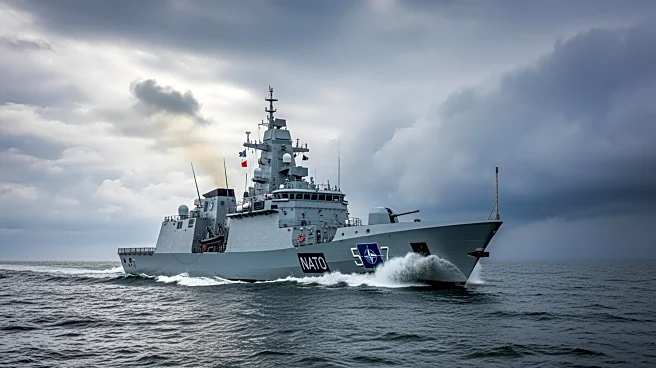What's Happening?
NATO Maritime Command has intensified its patrols in the Baltic Sea in response to a series of suspicious subsea damage incidents, believed to be linked to Russian activities. The patrols aim to deter
malicious actions such as anchor-dragging by Russia's 'shadow fleet' tankers. NATO's efforts have reportedly been successful, with no incidents of severed cables since last December. The U.S. Navy destroyer USS Bulkeley has joined the mission, equipped with Aegis radar to detect drone threats, marking the first deployment of a surface combatant for Baltic Sentry. The initiative follows unauthorized drone intrusions at Copenhagen airport and Danish military bases, suspected to be launched from vessels like the tanker Boracay.
Why It's Important?
The enhanced patrols in the Baltic Sea are crucial for maintaining regional security and deterring potential sabotage by Russian forces. This initiative underscores NATO's commitment to protecting critical infrastructure and ensuring safe maritime operations. The involvement of the U.S. Navy highlights the strategic importance of the Baltic region in countering Russian aggression. The successful deterrence of subsea sabotage and drone threats is vital for safeguarding communication lines and military installations, which are essential for NATO's operational readiness and the security of member states.
What's Next?
NATO plans to further increase its presence in the Baltic Sea, including deploying new surveillance systems and additional air defense frigates. This continued vigilance is necessary to address ongoing threats and prevent future incidents. The alliance's proactive measures may prompt Russia to reconsider its tactics, potentially leading to diplomatic engagements or escalations. NATO's actions could also influence other regional players to bolster their security measures, contributing to a broader effort to stabilize the area.
Beyond the Headlines
The situation in the Baltic Sea highlights the complex geopolitical dynamics between NATO and Russia. The ongoing patrols reflect the broader strategic competition and the need for robust defense mechanisms to counter unconventional threats. This development may lead to increased military spending and collaboration among NATO allies, reinforcing the alliance's collective security framework. Additionally, the focus on maritime security could drive technological advancements in surveillance and defense systems.









